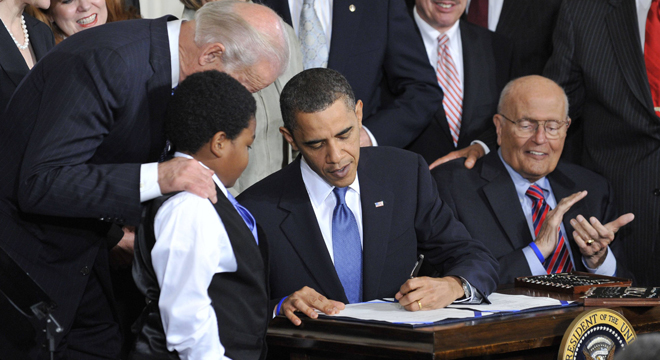The general contours of the White House’s backroom deal in mid-2009 to win the pharmaceutical industry’s support for health care reform were widely reported at the time. But the details remained obscured until Thursday, when a Republican-led investigation revealed the entirety of the negotiations and how the agreement was struck after nearly falling through.
The episode serves as an eye-opening glimpse into legislative sausage-making in Washington — backroom deals with industry groups are hardly uncommon. It’s also indicative of Obama’s preference for neutralizing and co-opting the major players on his signature legislation. Republicans are nevertheless highlighting the deal less than six months before Obama’s reelection to accuse him of breaking his promise to be open and transparent.
A spate of emails between senior officials at the White House and Pharmaceutical Research and Manufacturers of America (PhRMA) was released Thursday by GOP staff on the House Energy and Commerce Committee, resurrecting a discussion of the agreement that received criticism from progressives and conservatives alike at the time. The White House dismissed the new revelations as part of an election-year Republican witch hunt.
The parameters of the agreement were simple: In exchange for PhRMA’s support on health care reform and pledge of $80 billion in policies to help fund it, the White House would ensure that the legislation excluded drug importation, discounts on Medicare drugs, and certain other cost-saving measures that the industry opposed. The deal was reflected in the law and struck after a flurry of direct communications between the two sides.
The accord came together around June 2009. In one email early that month, President Obama’s point person on health care reform, Nancy-Ann DeParle, told PhRMA’s chief lobbyist she would make sure reimportation language in the bill was axed, in light of “how constructive” the industry group had been.
Later that September, PhRMA’s top lobbyist Bryant Hall told drug company executives in an email that White House deputy chief of staff assured in on a call that he’s following through. “Confidential: WH is working on some very explicit language on importation to kill it in health reform. This has to stay quiet,” Hall wrote.
But the agreement was not struck until the White House put the squeeze on a demurring PhRMA, warning Obama would champion a policy of rebates on Medicare prescription drugs if the group did not soon join the coalition of support. One of PhRMA’s members initially mocked the threat: “They can’t get 60 votes for that. It isn’t even a real threat,” wrote one staffer in an internal email. But the group wasn’t about to walk away from a sweet deal.
“We can’t turn back,” PhRMA’s leader Billy Tauzin, a former Democrat-turned-Republican congressman who once chaired the committee that released the emails Thursday, told his staffers. “And yes, that’s why they are doing it, but it’s also why we got a good deal.”
On June 17, 2009, Tauzin told Messina in an email that the major drug company CEOs had given the OK on the deal. “I can assure you that we will deliver a final yes to you by morning,” the PhRMA chief wrote to the White House deputy chief of staff.
Reached by TPM, neither the White House nor PhRMA denied the findings in the report.
“Last week, Republicans conceded this is not serious and instead a nakedly political, taxpayer-funded crusade to hurt the President’s re-election campaign,” White House spokesman Eric Schultz told TPM. “This is the same House Committee that has spent, according to one report, over $1 million in taxpayer dollars for the past 15 months looking into baseless allegations on Solyndra – but has done almost nothing to move legislation that would create jobs or grow the economy.”










